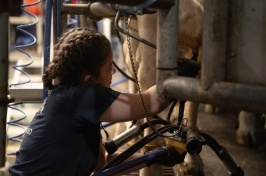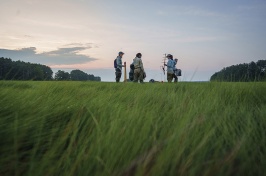College of Life Sciences & Agriculture
UNH Student Awarded Prestigious Graduate Fellowship
UNH undergraduate student Leandra Bryant ’25 has received the prestigious Graduate Research Fellowship (GRFP) from the National Science Foundation. Awarded to students pursuing master’s and doctoral degrees in science, technology, engineering and mathematics, the five-year fellowship includes three... Read More-
04/14/25
Predicting Better Colostrum for Healthier Calves
UNH research helps dairy farmers improve colostrum quality with data-driven insights on timing, environment, and nutrition to boost calf health and... -
-
04/04/25
Lab, Reimagined
David Needle has 900 samples of moose poop. “As one does,” quips the senior veterinary pathologist at UNH’s New Hampshire Diagnostic Veterinary Lab... -
04/04/25
Pollution Solution
For a time, UNH researchers Paula Mouser and Adam Wymore were connected only by the invisible chemicals they were studying. That is, Mouser, a...
Recent Stories
-
05/26/23 - Forestry Researchers Share $1M NSF AwardBecause forests don’t recognize state lines, a new initiative funded by the National Science Foundation taps researchers from UNH and across Northern New England to accelerate... Read More
-
05/23/23 - For Young Adults, Heart Health Begins with SleepNHAES study: Poor sleep harms metabolism in emerging adults; consistently oversleeping also has adverse effects. Read More
-
05/19/23 - Exploring the Link Between Forest Biodiversity and Psychological WellbeingNHAES-supported study explores mental wellbeing in biodiverse settings, assesses if recreating in biodiverse settings helps enhance mental health. Read More
-
05/18/23 - Should You Be Topping Your Brussels Sprouts?Research led by New Hampshire Agricultural Experiment Station scientist Becky Sideman examined "topping" — or removal of the top stem — of Brussels sprout varieties grown in New... Read More
-
05/11/23 - Helping a Forest to Grow: Spreading Fungal Spores by Wind Vs. Small MammalsAn interdisciplinary team of UNH researchers recently shared their findings into how wind and small mammals—eastern chipmunks, southern red-backed voles and woodland jumping mice—... Read More
-
05/08/23 - Six Students, Alumni Receive NSF Graduate Research FellowshipsThree UNH students and three alumni received National Science Foundation Graduate Research Fellowships, a record number for UNH. Read More
-
05/01/23 - Quantitative ConfidenceAlthough developments in biology over the past 20 years increasingly require researchers to use advanced quantitative skills such as mathematics, statistics and programming,... Read More
-
05/01/23 - URC Showcases Research From More Than 1,500 StudentsMore than 1,500 students made presentations during this year’s Undergraduate Research Conference (URC), one of the largest and most diverse events of its kind in the country and a... Read More
-
04/28/23 - Using Passive Acoustic Monitoring and Genetics to Determine Habitat Connectivity in the Gulf of MaineNew research at the UNH College of Life Sciences and Agriculture and the Center for Acoustics Research & Education uses passive acoustic monitoring and metabarcoding seawater... Read More
-
04/18/23 - Mapping the Value of Water Quality ImprovementsUNH researcher Wil Wollheim maps and data to new research published in the Proceedings of the National Academy of Sciences (PNAS) that looked at households' willingness to pay for... Read More





























































